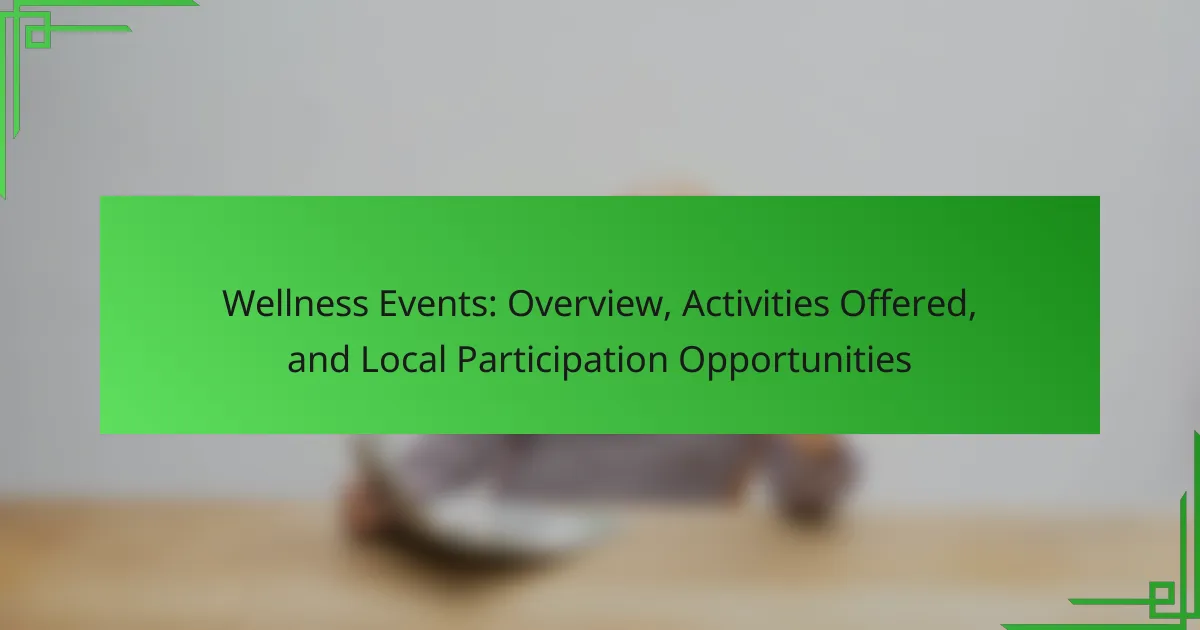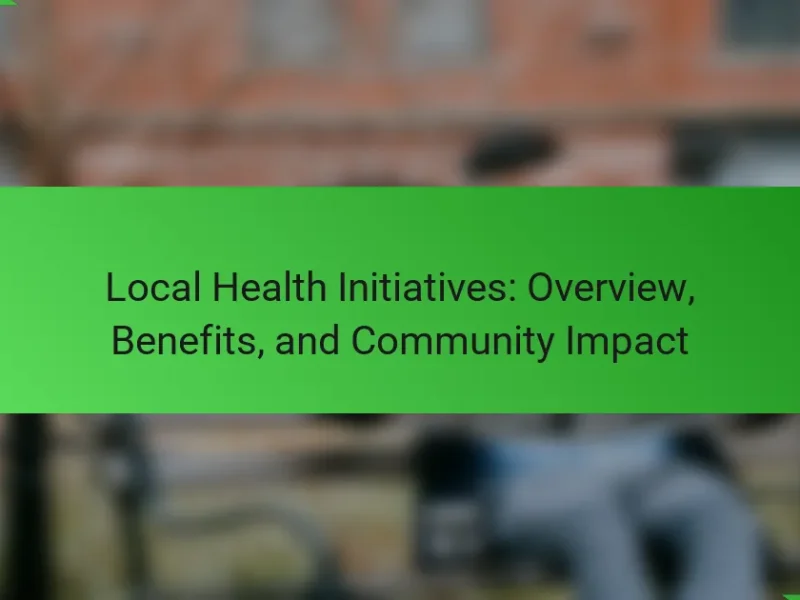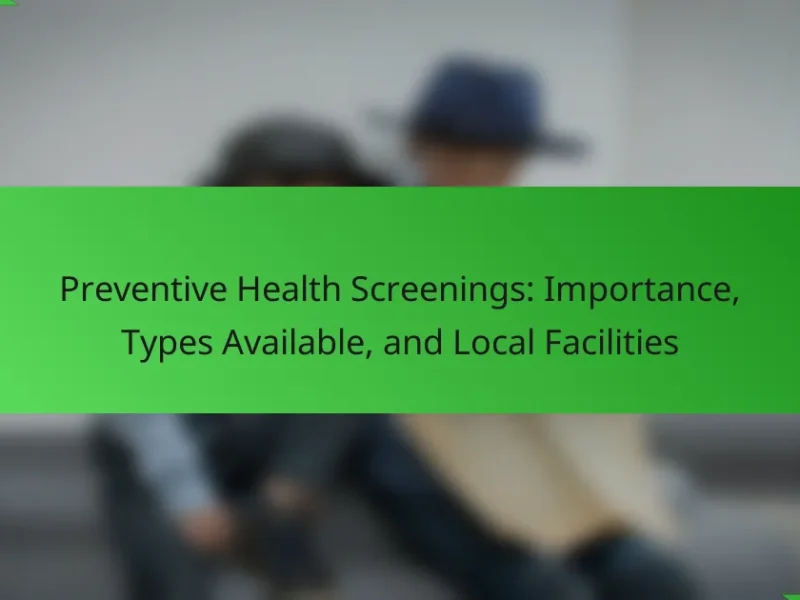Wellness events are organized activities designed to enhance health and well-being, encompassing workshops, retreats, fitness classes, and health fairs. These events focus on educating participants about physical, mental, and emotional wellness through hands-on activities such as yoga, meditation, and nutrition workshops, often led by expert speakers and health professionals. The article highlights the growing trend of wellness tourism and outlines various activities available at these events, including holistic therapies, nature walks, and creative outlets. Additionally, it provides information on how individuals can participate in local wellness events through online registration, community engagement, and volunteering opportunities.
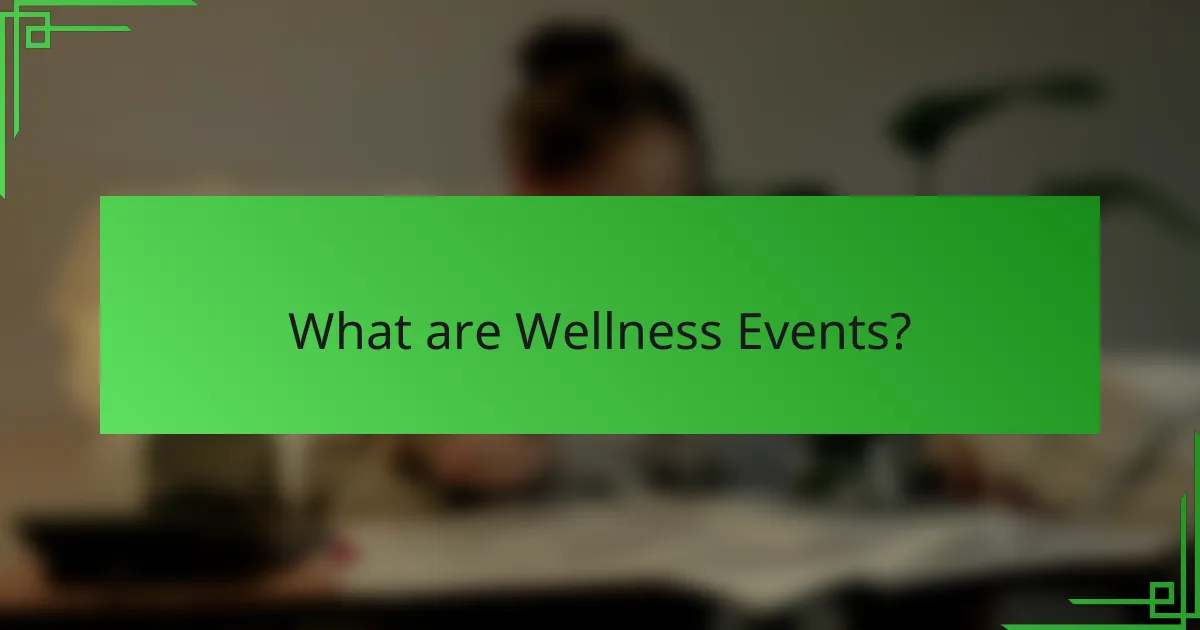
What are Wellness Events?
Wellness events are organized activities focused on promoting health and well-being. These events can include workshops, retreats, fitness classes, and health fairs. They aim to educate participants about physical, mental, and emotional wellness. Many wellness events offer hands-on activities like yoga, meditation, and nutrition workshops. They often feature expert speakers and health professionals. According to a report by the Global Wellness Institute, wellness tourism is a growing industry, indicating a rising interest in such events. These gatherings foster community engagement and support healthy lifestyles.
How do Wellness Events contribute to community health?
Wellness events contribute to community health by promoting physical activity and mental well-being. These events often include exercise classes, health screenings, and nutrition workshops. They encourage community members to engage in healthier lifestyles. Participation in wellness events can lead to increased awareness of health issues. Studies show that communities with regular wellness events see lower rates of chronic diseases. For example, a report from the American Public Health Association indicates that such events improve community health outcomes. They also foster social connections among residents, enhancing mental health. Overall, wellness events serve as a catalyst for positive health changes in communities.
What types of communities typically host Wellness Events?
Wellness events are typically hosted by various types of communities. These include health-focused organizations, such as gyms and wellness centers. Local governments often organize wellness events to promote public health. Schools and educational institutions frequently host wellness fairs for students and families. Nonprofit organizations dedicated to health initiatives also play a significant role. Additionally, community centers and parks often serve as venues for wellness activities. Research shows that diverse community involvement enhances participation and outreach. Engaging different groups fosters a collaborative environment for wellness promotion.
What are the historical roots of Wellness Events?
Wellness events have historical roots in ancient practices focused on health and well-being. These events can be traced back to traditional healing rituals in cultures such as Ayurveda in India and ancient Greek medicine. In the 20th century, the modern wellness movement emerged, emphasizing holistic approaches to health. The 1960s saw a rise in interest in alternative medicine and lifestyle changes. This led to organized gatherings promoting fitness, nutrition, and mental health. Over time, wellness events have evolved to include workshops, retreats, and community activities. Today, they reflect a blend of ancient wisdom and contemporary health trends.
Why are Wellness Events important for personal well-being?
Wellness events are important for personal well-being because they promote physical, mental, and emotional health. These events often provide opportunities for individuals to engage in activities such as yoga, meditation, and nutrition workshops. Participation in these activities can lead to reduced stress levels and improved mood. Studies show that engaging in group activities can foster a sense of community and support. This social interaction is linked to better mental health outcomes. Additionally, wellness events often offer resources and information on healthy living. Access to expert advice can empower individuals to make informed health choices. Overall, wellness events contribute to enhanced quality of life and personal growth.
How do Wellness Events promote physical health?
Wellness events promote physical health by providing structured activities that encourage movement and exercise. These events often include fitness classes, workshops, and outdoor activities. Participants engage in physical activities that improve cardiovascular health, strength, and flexibility. Research shows that regular participation in such events can lead to weight management and reduced risk of chronic diseases. For instance, a study published in the Journal of Physical Activity and Health found that community fitness events increased participants’ physical activity levels by 30%. Additionally, wellness events foster social connections, which can further motivate individuals to maintain an active lifestyle.
What mental health benefits can participants gain from Wellness Events?
Participants can gain various mental health benefits from Wellness Events. These benefits include reduced stress levels, improved mood, and enhanced emotional well-being. Engaging in structured activities promotes relaxation and mindfulness. Social interaction at these events fosters a sense of community. Research indicates that social support can significantly reduce feelings of loneliness and depression. Additionally, physical activities offered can boost endorphin levels, further improving mental health. Overall, Wellness Events provide a holistic approach to mental well-being.
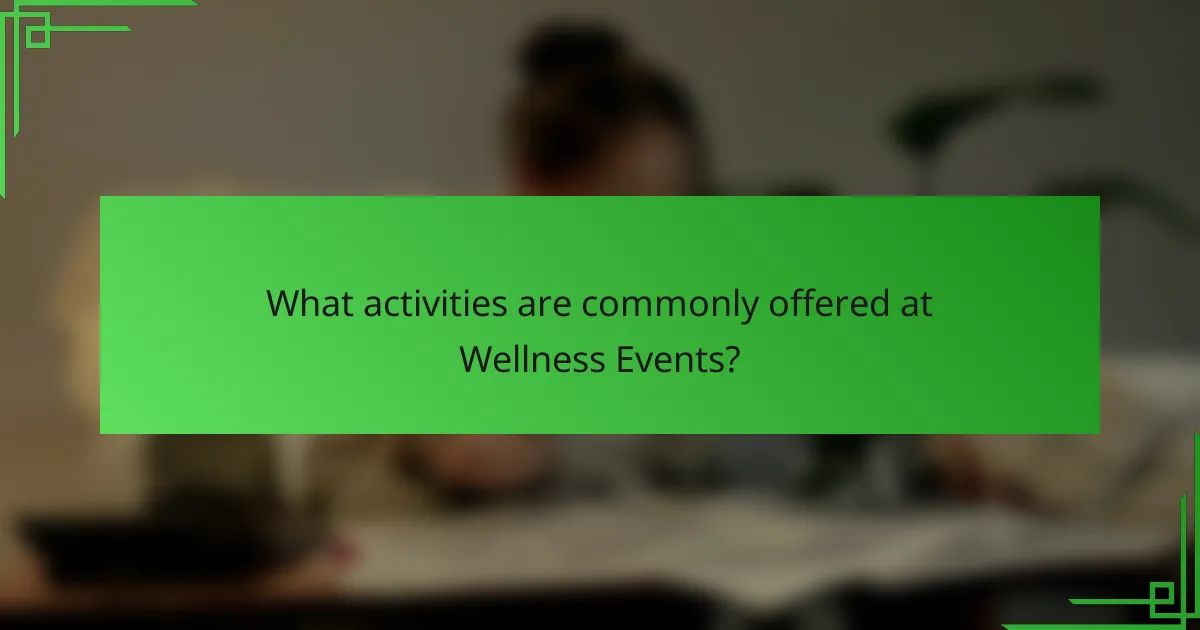
What activities are commonly offered at Wellness Events?
Wellness events commonly offer activities such as yoga classes, meditation sessions, and fitness workshops. These activities aim to promote physical and mental well-being. Participants often engage in nutrition workshops to learn about healthy eating. Many events feature holistic therapies like massage and acupuncture. Additionally, group activities such as nature walks and team sports are frequently included. Some wellness events provide educational talks on stress management and mindfulness. Creative outlets, like art therapy and dance classes, are also popular. Overall, these activities cater to diverse interests and wellness goals.
What types of fitness activities can participants expect?
Participants can expect a variety of fitness activities at wellness events. Common activities include yoga sessions, which promote flexibility and relaxation. Group fitness classes such as Zumba or aerobics are often available, providing cardiovascular benefits. Strength training workshops may also be offered, focusing on building muscle and endurance. Outdoor activities like hiking or cycling are popular, encouraging participants to engage with nature while exercising. Additionally, mindfulness activities such as tai chi can enhance mental well-being. These diverse offerings cater to different fitness levels and preferences, ensuring inclusivity for all participants.
How do yoga and meditation sessions enhance wellness?
Yoga and meditation sessions enhance wellness by promoting physical, mental, and emotional health. These practices improve flexibility, strength, and balance, contributing to better physical health. They also reduce stress and anxiety, leading to improved mental well-being. Studies show that regular yoga practice can lower cortisol levels, a hormone associated with stress. Meditation enhances focus and concentration, further benefiting mental clarity. Additionally, both practices foster emotional resilience, helping individuals manage their emotions more effectively. Research published in the Journal of Clinical Psychology confirms that mindfulness meditation can significantly reduce symptoms of anxiety and depression. Overall, yoga and meditation sessions provide a holistic approach to enhancing overall wellness.
What role do group exercises play in building community?
Group exercises play a significant role in building community by fostering social connections among participants. They create a shared experience that encourages interaction and teamwork. This interaction helps individuals feel a sense of belonging. Studies show that social support in group settings enhances motivation and commitment to fitness goals. For example, a study published in the Journal of Physical Activity and Health found that group exercise participants reported higher levels of enjoyment and adherence to their exercise routines. Additionally, group exercises often lead to the formation of friendships outside the workout environment. This sense of camaraderie strengthens community ties and promotes a supportive atmosphere.
What wellness workshops are typically included?
Wellness workshops typically included are mindfulness meditation, yoga sessions, nutrition education, and stress management techniques. These workshops focus on enhancing mental and physical well-being. Mindfulness meditation helps participants reduce anxiety and improve focus. Yoga sessions promote flexibility and relaxation. Nutrition education offers insights into healthy eating habits. Stress management techniques provide tools to cope with daily pressures. Each workshop is designed to foster a holistic approach to wellness.
How do nutrition workshops educate attendees about healthy eating?
Nutrition workshops educate attendees about healthy eating through interactive sessions and practical demonstrations. These workshops typically cover essential topics such as balanced diets, portion control, and nutritional labels. Attendees learn about the benefits of various food groups and how to incorporate them into daily meals. Workshops often include hands-on cooking demonstrations to illustrate healthy meal preparation. Participants gain skills in meal planning and understanding nutritional information. Research shows that interactive learning increases retention of dietary knowledge. A study published in the Journal of Nutrition Education and Behavior found that participants improved their dietary habits after attending such workshops.
What skills can participants learn from stress management workshops?
Participants can learn various skills from stress management workshops. These skills include relaxation techniques such as deep breathing and mindfulness. Participants often gain time management skills to prioritize tasks effectively. They learn problem-solving strategies to address stressors constructively. Communication skills are enhanced, enabling better expression of feelings. Emotional regulation techniques help participants manage their reactions to stress. Additionally, workshops often teach coping mechanisms for dealing with anxiety. Research indicates that these skills can lead to improved mental health and overall well-being.
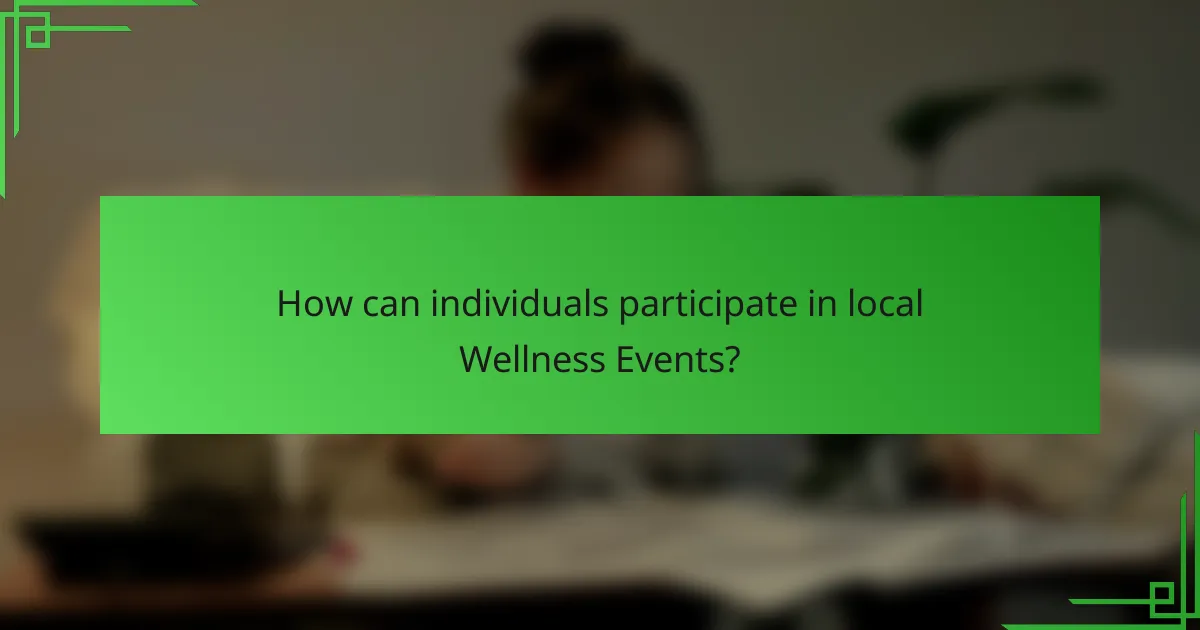
How can individuals participate in local Wellness Events?
Individuals can participate in local wellness events by registering for activities and workshops. Many events offer online registration through their official websites or social media pages. Participants can also sign up on-site at the event location. Networking with local wellness organizations can provide information on upcoming events. Community bulletin boards often list wellness activities and events. Engaging in local health and fitness groups can lead to event participation opportunities. Volunteering at wellness events can also be a way to get involved. These methods ensure individuals can actively join and benefit from local wellness initiatives.
What are the best ways to find Wellness Events in your area?
The best ways to find wellness events in your area include using local community boards and social media platforms. Websites like Meetup and Eventbrite list various wellness-related gatherings. Additionally, local gyms and wellness centers often post event schedules. Checking community health organizations can also yield valuable information. Many cities have newsletters or bulletin boards that feature upcoming events. Searching local Facebook groups focused on wellness can connect you with community members. Lastly, word of mouth from friends and family can be an effective way to discover events. These methods ensure a comprehensive approach to finding wellness activities nearby.
How can social media be used to discover local Wellness Events?
Social media can be used to discover local wellness events by following specific local groups and pages. Users can join community groups focused on wellness topics. These groups often share event information and updates. Additionally, platforms like Facebook have event features that list local happenings. Users can search for wellness events using relevant hashtags on Instagram and Twitter. Many wellness businesses also promote their events through social media advertising. Engaging with local health influencers can provide insights into upcoming events. According to a 2021 survey, 72% of event organizers use social media for promotion. This demonstrates the effectiveness of social media in connecting communities with local wellness activities.
What community boards or websites list upcoming Wellness Events?
Local community boards and websites that list upcoming Wellness Events include Eventbrite, Meetup, and Facebook Events. Eventbrite allows users to search specifically for wellness-related activities. Meetup connects individuals with similar interests in health and wellness. Facebook Events provides a platform for local wellness gatherings. Additionally, local health departments often maintain calendars of community wellness events. Local libraries and community centers may also post relevant events on their websites. These platforms are widely used to promote wellness activities and ensure community engagement.
What are the benefits of volunteering at Wellness Events?
Volunteering at wellness events offers numerous benefits. Participants gain valuable experience in health and wellness promotion. They have the opportunity to network with health professionals and like-minded individuals. Volunteering can enhance personal skills such as communication and teamwork. It also provides a sense of community involvement and fulfillment. Studies show that volunteering can improve mental health and reduce stress. Additionally, volunteers often receive free access to workshops and resources. Engaging in such events fosters a deeper understanding of wellness practices and community needs.
How does volunteering enhance personal growth and networking?
Volunteering enhances personal growth by developing skills and fostering self-awareness. It allows individuals to step out of their comfort zones. Engaging in diverse activities builds confidence and adaptability. Volunteering also promotes empathy and social responsibility. Networking opportunities arise through meeting like-minded individuals. Collaborating with others creates valuable professional connections. Research indicates that 85% of jobs are filled through networking. This demonstrates the importance of relationships built during volunteer work.
What skills can volunteers gain from participating in Wellness Events?
Volunteers can gain various skills from participating in Wellness Events. These skills include teamwork, as volunteers often collaborate with others to achieve common goals. Communication skills are enhanced through interactions with participants and other volunteers. Organizational skills are developed while planning and executing event activities. Leadership skills can emerge when volunteers take charge of specific tasks or groups. Problem-solving skills are honed as volunteers address challenges that arise during events. Additionally, volunteers can gain knowledge about health and wellness topics, improving their overall awareness. These skills are valuable in both personal and professional contexts, enhancing the volunteers’ capabilities.
What tips can help maximize your experience at Wellness Events?
To maximize your experience at wellness events, plan ahead by researching the schedule and speakers. This allows you to prioritize sessions that interest you most. Arrive early to secure a good spot and avoid missing key information. Engage with other attendees to network and share insights. Participate in interactive sessions to enhance your learning. Bring a notebook to jot down important takeaways. Stay hydrated and nourished to maintain your energy levels throughout the event. Lastly, follow up with connections made during the event to build lasting relationships.
How should you prepare for a Wellness Event to get the most out of it?
To prepare for a Wellness Event effectively, start by researching the event details. Identify the schedule, speakers, and activities planned. Create a list of goals for what you want to achieve at the event. This could include learning new techniques or networking with professionals. Pack necessary items such as a notebook, water bottle, and comfortable clothing. Arrive early to familiarize yourself with the venue and get settled. Engage actively during sessions by asking questions and participating in discussions. Follow up with contacts made after the event to maintain connections. These steps enhance your overall experience and learning outcomes at the Wellness Event.
What should you bring to ensure a positive experience at Wellness Events?
To ensure a positive experience at Wellness Events, bring essential items that enhance your participation. A water bottle is crucial for staying hydrated throughout the event. Comfortable clothing and shoes are important for engaging in activities without discomfort. A yoga mat may be needed for sessions that involve stretching or meditation. Snacks that are healthy can help maintain energy levels during the event. A journal or notepad allows for note-taking and reflection on experiences. Personal items like sunscreen or a hat can protect against sun exposure if the event is outdoors. Lastly, a positive attitude fosters openness to new experiences and connections.
Wellness Events are organized activities aimed at promoting health and well-being through workshops, retreats, fitness classes, and health fairs. These events focus on educating participants about physical, mental, and emotional wellness while fostering community engagement. Key topics include the contribution of wellness events to community health, the types of communities that host them, historical roots, and the various activities offered, such as yoga, meditation, and nutrition workshops. Additionally, the article outlines how individuals can participate in local wellness events, find them through community resources, and the benefits of volunteering at these gatherings.
